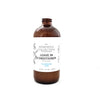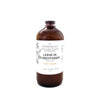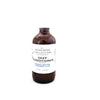By Dominique Harris
on March 25, 2020
With 0 comments
WHAT IS ASHWAGANDHA?
Ashwagandha (Withania Somnifera), translating to mean, 'The smell and strength of a horse', is an amazing adaptogenic plant that has been used in ancient and traditional Ayurvedic herbalism for centuries. An adaptogen is a non-toxic plant that is used in herbal medicine to help the body resist stressors of all kinds, whether physical, chemical, or biological. Adaptogens do for our adrenal glands what exercise does for our muscles. When you take adaptogens, you are training your body to handle the effects of stress. Ashwagandha is like a big hug when stress hits – strengthening and soothing! This gentle and nourishing herb is a member of the nightshade family that grows wild throughout the untamed dry landscapes of northern India. Ashwagandha contains many beneficial elements, including flavonoids and antioxidants, such as catalase, superoxide dismutase and glutathione, which is known as the “mother of all antioxidants.” It also contains alkaloids, amino acids (including tryptophan), neurotransmitters, sterols, tannins, lignans and triterpenes. These valuable compounds allow for the herb’s pharmacological activities and are responsible for the many ashwagandha benefits.

BENEFITS OF ASHWAGANDHA
Helps relieve stress:
Ashwagandha has been shown to promote healthy levels of cortisol and the healthy inflammatory processes that are stimulated in the response to stress. Cortisol is a stress hormone released from the adrenals that has evolutionarily helped the body to mobilize a "fight or flight" response to perceived imminent danger, freeing up resources for a vigorous fight against an intruder or flight from danger. Cortisol naturally follows a daily rhythm, rising in the morning to help mobilize the body's forces for the daily needs and lowering in the evening to allow the body to sleep and perform restorative processes. Cortisol is helpful as a short-term defense mechanism and as part of a natural daily rhythm. Ashwagandha also supports the hypothalamus-pituitary-adrenal axis that controls cortisol release from the adrenals. Healthy, normal cortisol output also supports the adrenal glands, which naturally allows the body to focus on reproductive health (source: Mahdi AA, Shukla KK, Ahmad MK et al. Evidence-based Complementary and Alternative Medicine Volume 2011, Article ID576962, 9 pages. Doi: 10.1093/ecam/nep138.)
Sex Drive and Higher Testosterone
Ashwagandha is an aphrodisiac as it has been long established in history as one. The legendary ‘Kama Sutra’ also mentions the plant as one of the very powerful sexual stimulants. In fact, ashwagandha is one very common ingredient in herbal aphrodisiac products. When men start taking ashwagandha, the production of nitric oxide is stimulated in their bodies. As a result of this, the blood vessels that carry blood to the genitals are dilatated. This causes an increase in sexual desire and satisfaction. Today, Ashwagandha has become a common form of treatment for loss of libido and even for erectile dysfunction.
Ashwagandha has been proven to raise the levels of testosterone significantly. As men age, the production of testosterone decreases in their bodies significantly. In fact, it is said that the level of testosterone drops by 0.4 to 2 percent in men after the age of 30 every year. there are two ways ashwagandha helps in restoring a good sex life. First, it helps in the production of testosterone. It increases the serum levels of the luteinizing hormone and testosterone and revitalizes the natural balance of sex hormones in men. In fact, a study in 2013 showed that ashwagandha revitalized the testosterone count in infertile men too.
Secondly, as ashwagandha is known to reduce stress by inhibiting the growth of cortisol, it also helps in the retardation of natural testosterone reduction. This, in turn, helps to keep the testosterone levels optimum for the body’s proper sexual functioning. (sources: (1) Mahdi AA, Shukla KK, Ahmad MK et al. Evidence-based Complementary and Alternative Medicine Volume 2011, article ID576962, 9 pages. Doi: 10.1093/ecam/nep138. (2) Winston, David and Maimes, Steven. "Adaptogens: Herbs for Strength, Stamina, and Stress Relief," Herbal Therapeutics. Rochester, Vt: 2007. )
Improves Underactive Thyroid Function
Ashwagandha has been shown to support a sluggish thyroid for people diagnosed with Hashimoto’s disease, or underactive thyroid. A 2017 pilot study published in the Journal of Alternative and Complementary Medicine, ashwagandha benefits for helping patients with subclinical hypothyroidism were evaluated. It was concluded that the herb may be beneficial for normalizing thyroid levels in patients with hypothyroidism. (source)
Improves Depression
Not only does ashwagandha benefit people who deal with anxiety and chronic stress, but it can also be helpful for people who experience signs of depression. The herb improves resistance toward stress, and studies show that it thereby improves people’s self-assessed quality of life. Researchers found that it exhibited antidepressant effects that were comparable to imipramine when rats were exposed to “behavioral despair” and “learned helplessness” tests. It was concluded that ashwagandha can be used as a mood stabilizer in clinical conditions of depression.
AutoImmunity
Lupus is an autoimmune disease that involves high levels of inflammation. In a mouse study, Ashwagandha reduced inflammatory markers that tend to be high in lupus and other autoimmune diseases, including IL-6 and TNF-alpha (Source and Source ). Check out this post by Mind, Body Green related to her experience using ashwagandha for her lupus
Venom Antidote
In India, Ashwagandha is used to treat snake bites and scorpion stings. A compound from Ashwagandha inhibits cobra and viper venom in mouse and cell studies (source and source)
Alzheimer's and Brain Memory
Alzheimer’s disease is a form of dementia caused by deposits of beta-amyloid proteins and loss of brain cells. Ashwagandha improved cognitive function and reduced beta-amyloid deposits in mouse models of Alzheimer’s (source and source). Emotional, physical and chemical stress can have damaging effects on the brain and nervous system. Recent research shows that ashwagandha is more than a stress reliever — it also protects the brain from cell degeneration, which can lead to neurodegenerative diseases like Alzheimer’s and Parkinson’s. One of the main reasons it is so effective at healing the brain is because it contains powerful antioxidants that destroy the free radicals that cause aging. Withaferin A and withanolide D are the two main withanolides in ashwagandha that are used to improve cognitive function. Withanolides are naturally occurring steroids that are commonly present in plants of the nightshade family. A 2017 pilot study published in the Journal of Dietary Supplements found that ashwagandha effectively enhanced both immediate and general memory in people with mild cognitive impairment. The herb was also able to improve attention, information processing speed, and mental skills. The study involved 50 adults who received 300 milligrams of ashwagandha root extract or placebo for an eight-week period. Researchers concluded that ashwagandha treatment was able to boost memory and other cognitive skills.
Boosts Immune Function
Because ashwagandha works as an adaptogen that can reduce the body’s stress hormones, it can help boost your immune system and reduce inflammation within the body by increasing immunoglobulin production. It is also able to promote an anti-inflammatory environment by suppressing pro-inflammatory cytokines. By downregulating the immune system when it’s compromised, this adaptogenic herb might be a useful tool in the treatment of various inflammatory disorders.
Helps Increase Muscle Strength
A surprising ashwagandha benefit is its ability to increase muscle mass and strength. For this reason, it might be a helpful tool for people engaging in resistance training and other forms of exercise that can be strenuous on your muscles. (source)
Balances Blood Sugar Levels
Ashwagandha has been evaluated for its anti-diabetic effects, which are possible because of the presence of phenolic compounds, including flavonoids.
Helps Fight Cancer
Ashwagandha has promising anti-tumor effects, can help reduce tumor cell growth and may work to prevent cancer cells from growing. The extract has been shown to help inhibit the proliferation of cancer cells — specifically breast, lung, stomach, and colon cancer cells, which are among the leading types of cancers in the world. It’s believed that ashwagandha helps prevent the growth of cancer cells mostly due to its immune-boosting and antioxidant abilities.
Nutritional Information
1,000 milligrams of dehydrated ashwagandha root powder contains the following:
-
2.5 calories
-
0.04 gram protein
-
0.032 gram fiber
-
0.05 gram carbohydrates
-
0.03 milligram iron
-
0.02 milligram calcium
-
0.08 microgram carotene
-
0.06 milligram vitamin C
Risks and Side Effects
When used as directed, ashwagandha is considered safe for consumption. However, in some cases, it may cause symptoms like diarrhea, vomiting and abdominal pain. If you experience these or any other ashwagandha negative side effects, discontinue use and consult with your doctor. Always start with a low dosage.
Ashwagandha is also not recommended for:
Pregnant Women
Breastfeeding Mothers
If you have any underlying health conditions or take any medications, it’s best to talk to your doctor before starting supplementation.
Ashwagandha may interfere with medications used to lower blood sugar, reduce blood pressure or treat thyroid problems.
Discontinue use two weeks before a scheduled surgery as ashwagandha can interfere with the anesthesia.
How To Enjoy:
You can take ashwagandha supplements in pill form by a recommended supplier such as Mountain Rose Herbs
Enjoy the powder (has a slightly bitter taste and the smell of a horse) in teas or smoothies from this reputable source
Or enjoy in extract form and add to water, tea or juice from this reputable source


















Comments